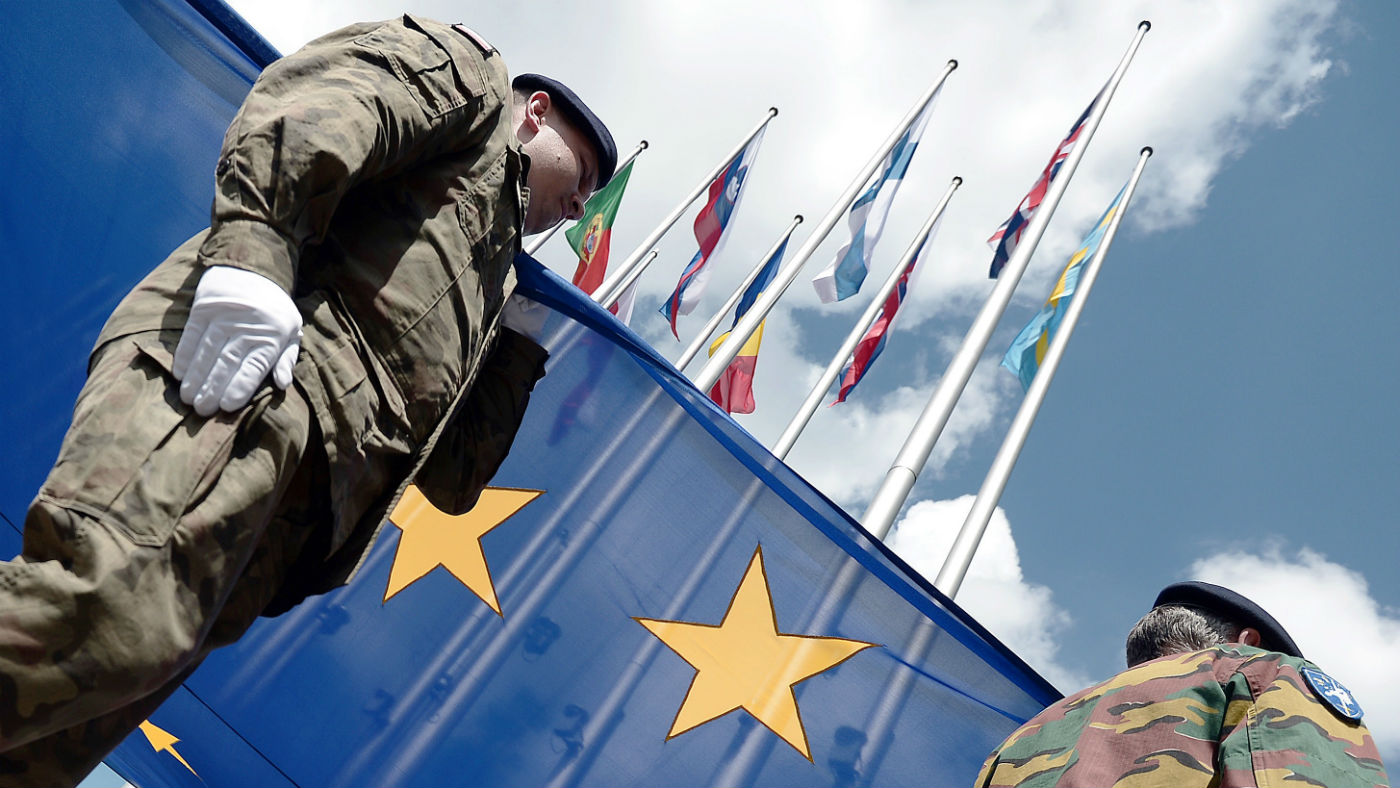EU makes ‘historic step’ towards integrated defence force
23 European governments sign defence pact bringing decades-long dream of EU army within reach

A free daily email with the biggest news stories of the day – and the best features from TheWeek.com
You are now subscribed
Your newsletter sign-up was successful
Europe’s decades-long intention to create an integrated defence force moved a step closer yesterday after 23 EU governments signed a pact to fund, develop and deploy joint armed forces.
Foreign and defence ministers gathered at a signing ceremony in Brussels, paving the way for EU leaders to sign a formal deal in December. Apart from the UK, the pact excludes Denmark, which has opted out of defence matters, and neutral Ireland, Portugal and Malta.
First proposed in the 1950s, an integrated defence policy had long been blocked by Britain. But with the UK set to the leave the bloc and the US pushing Europe to pay more for its security, hopes for unified European defence planning, operations and weapons development “now stands its best chance in years”, says Reuters.
The Week
Escape your echo chamber. Get the facts behind the news, plus analysis from multiple perspectives.

Sign up for The Week's Free Newsletters
From our morning news briefing to a weekly Good News Newsletter, get the best of The Week delivered directly to your inbox.
From our morning news briefing to a weekly Good News Newsletter, get the best of The Week delivered directly to your inbox.
It also reports that unlike previous Franco-German-led efforts towards integration, the new initiative is supported by Nato, boosting its chances of success.
Speaking in Brussels, Germany’s foreign minister Sigmar Gabriel told reporters the deal represented a “historic step” and “a milestone in European development”.
Supporters of further integration say it will give the EU a more coherent and comprehensive role in tackling international crises while also making it less reliant on the US for logistical support.
The EU initiative, known as Permanent Structured Cooperation, will be backed by a $5bn-a-year defence fund for buying weapons, a fund to finance operations and money from the EU’s common budget for defence research. A national review system will also identify weak spots in European armies with the goal of plugging them.
A free daily email with the biggest news stories of the day – and the best features from TheWeek.com
Despite Brexit, British aerospace and defence firms are pushing for involvement in the initiative amid fears they will lose out to European competitors. While full involvement is unlikely, “in a possible compromise, Britain may be able to join in, but only on an exceptional basis if it provides substantial funds and expertise”, says Reuters.
-
 Local elections 2026: where are they and who is expected to win?
Local elections 2026: where are they and who is expected to win?The Explainer Labour is braced for heavy losses and U-turn on postponing some council elections hasn’t helped the party’s prospects
-
 6 of the world’s most accessible destinations
6 of the world’s most accessible destinationsThe Week Recommends Experience all of Berlin, Singapore and Sydney
-
 How the FCC’s ‘equal time’ rule works
How the FCC’s ‘equal time’ rule worksIn the Spotlight The law is at the heart of the Colbert-CBS conflict
-
 Epstein files topple law CEO, roil UK government
Epstein files topple law CEO, roil UK governmentSpeed Read Peter Mandelson, Britain’s former ambassador to the US, is caught up in the scandal
-
 Iran and US prepare to meet after skirmishes
Iran and US prepare to meet after skirmishesSpeed Read The incident comes amid heightened tensions in the Middle East
-
 Grok in the crosshairs as EU launches deepfake porn probe
Grok in the crosshairs as EU launches deepfake porn probeIN THE SPOTLIGHT The European Union has officially begun investigating Elon Musk’s proprietary AI, as regulators zero in on Grok’s porn problem and its impact continent-wide
-
 Israel retrieves final hostage’s body from Gaza
Israel retrieves final hostage’s body from GazaSpeed Read The 24-year-old police officer was killed during the initial Hamas attack
-
 China’s Xi targets top general in growing purge
China’s Xi targets top general in growing purgeSpeed Read Zhang Youxia is being investigated over ‘grave violations’ of the law
-
 Panama and Canada are negotiating over a crucial copper mine
Panama and Canada are negotiating over a crucial copper mineIn the Spotlight Panama is set to make a final decision on the mine this summer
-
 Europe moves troops to Greenland as Trump fixates
Europe moves troops to Greenland as Trump fixatesSpeed Read Foreign ministers of Greenland and Denmark met at the White House yesterday
-
 Why Greenland’s natural resources are nearly impossible to mine
Why Greenland’s natural resources are nearly impossible to mineThe Explainer The country’s natural landscape makes the task extremely difficult